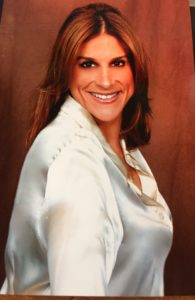It was scary. Parents were huddled together at a baseball field in Santa Monica in June 2009, worried about Dana Rivera, who was in the hospital following a stroke. Her son Nicky was playing, but no one was sure about her fate.
The Pacific Palisades resident survived, but the story of the mother of four, who at the age of 44 collapsed in a store, was terrifying.
Rivera was a busy mom, constantly on the go as she shuttled her three sons and a daughter to sporting activities and school. When not with her kids, she was an avowed gym rat.
This petite woman, who always looked great in her wedge high heels and perfect outfits, was happily married to husband Rick.
When Rivera collapsed in a store, she recalls, “I could hear the employees asking me if I was OK, but I couldn’t say anything or pick my body up.” She was having a transient ischemic stroke, also called a mini-stroke. But at the hospital, when her symptoms subsided, doctors diagnosed her with a menopausal migraine and sent her home.
On the way home, Rivera went into a full-blown ischemic stroke and started vomiting. She was rushed back to UCLA Medical Center Santa Monica. By the time they got there, her left side was paralyzed.
Imaging scans revealed she had a hole between the upper chambers of her heart, called a patent foramen ovale (PFO). Although everyone is born with such an opening, it typically closes within a few months. But in about a quarter of people, the hole remains open, creating a portal for blood clots to escape the heart.
The body forms tiny clots all the time, but tiny capillaries in the lungs usually filter out those clots before sending the oxygenated blood back to the heart and then on to the rest of the body, such as the brain. Doctors closed Rivera’s PFO six months later to prevent clots from again passing through the opening.
The diagnosis was just the beginning of a new life for Rivera. “My life was in shambles,” she recalls. “I was the mother of four teenagers, and I didn’t know if I’d ever be able to walk or use my hand or arm again.”
She started slow, using a walker, a cane and then a brace to walk each morning with her husband, increasing distances gradually. Yoga helped her manage anxiety.
Rivera motivated herself with a special goal: the ability to wear high heels again.
“I love high heels and wedges and feel very feminine and empowered,” she said. “That drove me to get better.”
She was able to regain her independence and resume many of her old routines — including wearing high heels — within four and a half months. But it was a full year before Rivera felt like her old self again.
Before Covid-19 closed gyms in March, your Circling the News editor saw Rivera at the Bay Club on Sunset, where she had just finished exercising, and asked her for an update.
Via an email interview, I asked how she was. “Physically I am fantastic. Just last June I celebrated the 10-year mark of my stroke and said to myself, “How can I be going on 11 years?”
She said that prior to gym shutdowns, she was going to the gym six days a week. The first hour was dedicated to cardio and the second hour to weight training. “I find that I am still doing that in isolation,” Rivera said. “My doctor confirms I am leading a healthy and active life with a cautious history of stroke.”
Before the pandemic, Rivera was facilitating four stroke support groups (at St. John’s, UCLA, Pacific Palisades and Brentwood) and one caregivers’ group. “The evolution of my groups has allowed me to become connected with survivors and caregivers and to provide hope, resources and encouragement,” she said. “I really find that I can call myself a professional now.”

Dana and husband Rick with their three sons who played hockey for the USA in the Maccabiah Games They are also joined by daughter Sophia.
Today, her oldest son Jake, 29, is a real estate agent in Rochester, New York and he and his wife Taylor are expecting their first child in November. Sophia, 27, is engaged and working in San Francisco as a community manager. Luke, 26, is also engaged and is working as an agent for Cushman & Wakefield Commercial Real Estate in Los Angeles and Nicky, 24, who played hockey through college at Minnesota State, hopes to continue in the sport.
Rivera’s message to stroke patients and those who love them is strong. “My one message would be, you are not alone in this,” she said. “If you put yourself out there and make yourself available to these groups (and fellow survivors), you can find your purpose again.”
Rivera has been helping scores of individuals. She tells people, “A stroke survivor’s identity after surviving a stroke is completely compromised due to the brain injury.”
To contact Rivera about a group, email danasusanrivera@gmail.


FABULOUS WOMAN! So dedicated………M
An inspiring article which clearly shows dana to be a committed woman who does terrific work. Congratulations to her. Love, louise and ronny